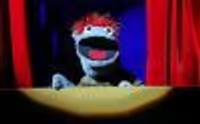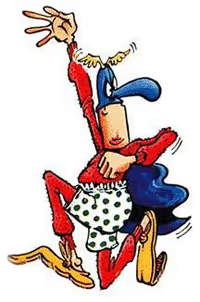Am I The Only One That Disliked "Matilda"???!!!
BwayFan4
Chorus Member Joined: 5/25/05
#125Am I The Only One That Disliked
Posted: 4/18/13 at 1:08pm
It's also a jump to think that because your kid goes to Harvard that the inner city kids can do it if they just work hard so it's their fault for slacking off... but people think that way all the time ![]()
#126Am I The Only One That Disliked
Posted: 4/18/13 at 1:09pmWell, yeah- I mean, most characters in fairy tales get help from other people, but save themselves. If Matilda didn't save herself, the story would be pointless and frankly, pretty boring.
#127Am I The Only One That Disliked
Posted: 4/18/13 at 1:15pm
I think we've reached the point where the conversation has descended into utter silliness when we're actually discussing the possibility of people confusing Matilda's story with reality.
One would truly need to be insane to believe Matilda is or reflects real life. That kind of person would be sitting by their fireplace waiting for talking mice to make them a ball gown.
BwayFan4
Chorus Member Joined: 5/25/05
#128Am I The Only One That Disliked
Posted: 4/18/13 at 1:19pm
The original comment was that "Matilda minimalizes the effects of child abuse because, even though abused, she is totally in control of her situation and fixes it on her own." It ended up in a whole philosophical discussion for whatever reason. But you're right...it's gotten silly. So let's stop.
Updated On: 4/18/13 at 01:19 PM
#129Am I The Only One That Disliked
Posted: 4/18/13 at 1:45pm
Matilda minimalizes the effects of child abuse because, even though abused, she is totally in control of her situation and fixes it on her own.
Except she doesn't really fix it on her own and the story does not minimalize the effects of child abuse.
it's dangerous to imply that children can simply save themselves because people then can come to the misconception about abused children that "Hey look... if Matilda can do it, why can't everyone?"
Except that's not what actually happens. But even more to your point (not the point of the story of Matilda), some children can learn to overcome abusive situations on their own even if they cannot change their living situations (Matilda never changes family or having to live with them on her own). This I personally know to be true. Matilda is about the importance of education, confidence, encouragement, respect, love and support. It's these tools that save Matilda. She can only do so much, but she still needs the recognition from adults who share the same values because she IS still a child who cannot do everything herself.
ullabelt
Stand-by Joined: 3/26/06
#130Am I The Only One That Disliked
Posted: 4/18/13 at 1:53pm
johnadams - the book is about a child with special powers and the creative team of the musical have specifically stated that they made a decision to go against that.
Even if you havnt read the book - The girl makes chalk move with her mind...how is that not special? And my point is only that I feel its not set up very well. In the book and movie adaptation her powers grow early on - to have it introduced so late on in the second act feels like an after thought. However I am very sorry for sharing my opinion and I shall know better the next time I answer a question about public opinion on a public discussion board. I do hope you can forgive me john
#131Am I The Only One That Disliked
Posted: 4/18/13 at 1:59pm
>> That kind of person would be sitting by their fireplace waiting for talking mice to make them a ball gown."
Don't burst my bubble.
[JA stands in front of a mirror, fervently waving a broken car antenna at his reflection chanting, "BALL gown... ball GOWN..."]
Updated On: 4/18/13 at 01:59 PM
Trish2
Broadway Legend Joined: 8/20/06
#132Am I The Only One That Disliked
Posted: 4/20/13 at 10:55pm

per the NY Times....
Theater Talkback: In the Minority
#133Am I The Only One That Disliked
Posted: 4/20/13 at 11:35pm
She absolutely changes her story. That's basically, um, the whole show. Her first song has lyrics about basically if you don't like your life, change it. These are all abstract-ish themes because at the end of the day it's a fantasy children's book. It is not set in a reality. No child is going to a school that is that awful, etc. And Matilda is no idiot. She doesn't for one second believe in what her parents are calling her or telling her. She's not going into her room crying and bemoaning her situation. She's just like "whatever" and living her life. And she sees a way out of it when her father says "Do you want to live with Miss Honey?" And she quickly nods yes.
I don't think a child would even pick up on the fact that she's being mentally and emotionally "abused." I think you all are projecting real world problems onto a child's fantasy musical.
And back to the point of the thread: I don't believe Muscle or After Eight have ever stated what they didn't like about the show. What was so wrong with the book? And the music? I for one have had "Naughty" stuck in my head all week, and the refrain of "When I Grow Up." It may not be as instantly memorable as some other shows, but I think the lyrics/melody in "Naughty" out weigh the entire score of "Kinky Boots."
After Eight
Broadway Legend Joined: 6/5/09
#134Am I The Only One That Disliked
Posted: 4/21/13 at 12:56am
"I don't believe Muscle or After Eight have ever stated what they didn't like about the show."
Why not try reading before opining? Here's what I wrote on the first page of this thread.
"Dull, unpleasant book and weak score."
How much clearer can I be?
As for all this long-winded pseudo-intellectual gobbledygook about "empowerment," and other such guff---really! What a heap of pretentious bunk! (Propriety prevents me from using another word.)
#135Am I The Only One That Disliked
Posted: 4/21/13 at 10:19amI would think After Eight would embrace pretentious bunk. It's all he ever writes.
#136Am I The Only One That Disliked
Posted: 4/21/13 at 11:20amIt may be unrealistic for a neglected, or even abused, 5 year old to have the ability to change her situation or "put it right." My take however was that this was a satirical work of fiction that was brought to the stage. I thought Dahl and musicals' creatives hoped to motivate children (of all ages) to read more and perhaps watch less "telly." I thought it was probably from all her reading that Matilda realized her parents were "stupid" and "rude" in the first place, gave her self confidence and maybe even got some ideas on how to "set things right." Remember "Telly"? What else would account for how a 5 year old who was ignored, had not started school yet and theoretically had little exposure to other people outside her neglectful family would have figured out that her situation even needed to be set right? If promoting literacy was their goal, it would explain why they down played her "powers."
#137Am I The Only One That Disliked
Posted: 4/21/13 at 11:42amAfter Eight. I read that bit. But...that's not exactly telling. What did you not like about it? Why did the book not work for you? What did you dislike about the score? What did you think about the design? The actors? The direction? Your reviews, if you can even call them that, are about as snarky and airless as an 8th graders history paper. I'm just asking you to expand what you said. I don't care that you didn't like it. I just want to know more about what you didn't like.
After Eight
Broadway Legend Joined: 6/5/09
#138Am I The Only One That Disliked
Posted: 4/21/13 at 8:13pm
Ripped Man,
As you know, you're one of the posters I most admire on this board (at least until now.) So you can imagine how much it pained me to have had to chide you previously. As much as it pains me to point out to you now that truly, you are acting like a real pain.
"Your reviews, if you can even call them that, are about as snarky and airless as an 8th graders history paper."
Sorry, teach. How's about just giving me an F in English Composition and calling it a day?
"I'm just asking you to expand what you said."
Here's the deal, RM. I don't feel like it. And more importantly, there's really no need to. I don't have to use five zillion words to convey what a mere handful can.
I said it was dull. What more to you want me to do? Cite every line as proof? Do you ask the same of those who say they were captivated by every minute of the show?
I said it was unpleasant. Having seen the show, surely you know what I'm referring to. Why spell out what is obvious?
I said the score was weak. To show you what an accommodating sort I am, I'll "expand" by sayng the music was thin, watery, and as palatable as cod liver oil.
I hope that will earn me a passing grade, but if not I'll accept my F, head bowed in shame, and go about listening to something like Oklahoma!, My Fair Lady, or Hello, Dolly! Shows with beautiful music.
#139Am I The Only One That Disliked
Posted: 4/21/13 at 11:45pm
Thanks, and I'm making it a life goal to make you enjoy something written in the 21st Century.
I just honestly can't understand how you could find the show dull. Sure, not liking the story, music, book, whatever. But to say it was dull? Have you seen the show? They threw a girl by her pigtails into the audience. The man playing Trenchbull is anything but dull. The confetti cans are not dull. The energetic choreography is not dull. Sorry, I just don't understand.
#140Am I The Only One That Disliked
Posted: 4/22/13 at 1:42am
Exactly, they threw a girl by her pigtails into the audience. I honestly don't go to Broadway to see any form of abuse. I don't find it entertaining.
It was a horrible evening to me. To call Matilda 'dull' is a compliment I'd say.
#141Am I The Only One That Disliked
Posted: 4/22/13 at 8:10am
>> "I honestly don't go to Broadway to see any form of abuse. I don't find it entertaining."
But, this is Matilda, not Precious. You're not supposed to interpret scenarios like swinging children around by their pigtails as literal events, just like most people wouldn't believe that Winnie the Pooh actually talks to Christopher Robin, or an Acme anvil actually flattens Wile E. Coyote's head. The characters and events are deliberately over-exaggerated because children find that entertaining.
IMO, some people simply don't care for Dahl's choice as a writer to exaggerate (or include) the "darker" elements of childhood rather than to create his fictional worlds with sunshine, lollipops and rainbows.
I can understand that.
Updated On: 4/22/13 at 08:10 AM
After Eight
Broadway Legend Joined: 6/5/09
#142Am I The Only One That Disliked
Posted: 4/22/13 at 9:12am
"But, this is Matilda, not Precious. You're not supposed to interpret scenarios like swinging children around by their pigtails as literal events"
How about the parental abuse of their child?
"I can understand that."
Mmm, a mite condescending, I would say. What you don't seem to understand, John Adams, is that it makes no difference whether you "understand" or not. Nor is it your place to "understand;" it's merely to accept that others feel as they do.
Updated On: 4/22/13 at 09:12 AM
#143Am I The Only One That Disliked
Posted: 4/22/13 at 9:44am
> "it makes no difference whether you "understand" or not. Nor is it your place to "understand;" it's merely to accept that others feel as they do."
http://www.thesaurus.net/understand
Videos







